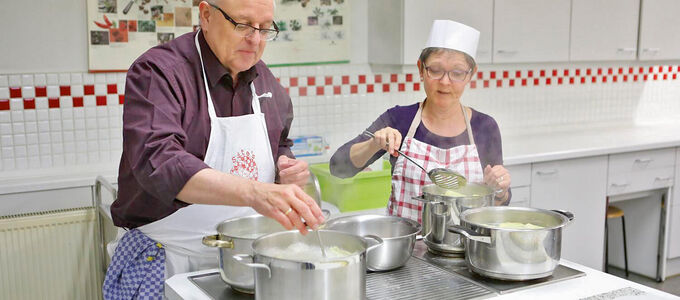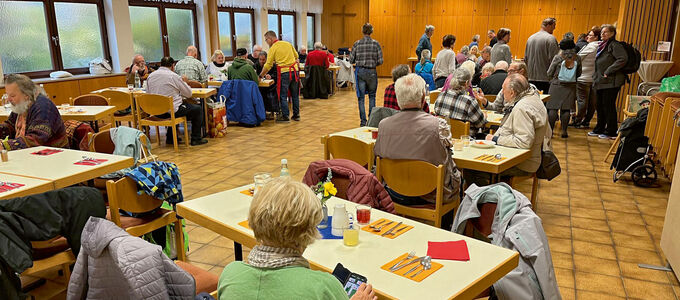
Poverty is particularly painful in the cold season. Those who can, make themselves comfortable at home. For those who do not have a home, a warm meal and some friendly conversation can be a ray of hope, for example in a church-cum-soup-kitchen.
The idea of a hot meal and a place to warm up for the poor and homeless in the city of Stuttgart (Germany) came up in 1995. It was based on the words of Jesus, “Assuredly, I say to you, inasmuch as you did it to one of the least of these My brethren, you did it to Me” (Matthew 25: 40). Since then, around 70 Vesperkirchen, soup kitchens that operate out of churches, have been established in various regions of Germany, offering a warm meal to the poor and the homeless during the cold months. Guests can enjoy a warm meal for a symbolic price. There are other offers as well and they vary depending on the location: from snack packs, medical care, free haircuts, crisis management, and career counselling to concerts and lectures. The term vesper has Alemannic roots and used to refer to a snack. Nowadays it is a full meal.
Praying, slicing, and serving
The Evangelical Methodist Church and the Catholic Church in Backnang in Germany run a soup kitchen from November to March. It is not just about offering food to those who need it, but also about creating opportunities to foster social bonds.
Members from the New Apostolic congregation in Backnang have been supporting the soup kitchen teams since April 2023. In the meantime, friendships have developed across denominational boundaries. “Around six to eight members from the New Apostolic Church in Backnang help run the soup kitchen, always in pairs,” reports Thomas Haag, a retired Evangelist. “The volunteers meet at quarter to nine in the morning for a short devotional before the cooking starts.” Depending on the dish, 20 kilograms of potatoes have to be peeled or ten kilos of onions chopped. Up to ninety people who cannot afford to feed themselves come to the soup kitchen in Backnang. “There is a need to extend the programme to several times a week,” says Thomas Haag. “But there are not enough volunteers nor do we have the financial resources.”
Hundreds of Maultaschen
Members of the New Apostolic Church in the district of Göppingen/Kirchheim in Germany have also been supporting the Kirchheim soup kitchen since it started in 2009. On one of the Saturdays, the New Apostolic cooks take over and are responsible for the cooking.
The Kirchheim soup kitchen is not just about helping people living in poverty, it is also about fostering social bonds. The meal always begins with a prayer. At the start of the soup kitchen season, the Evangelical Church organises a divine service. Once already, a New Apostolic gospel choir provided the musical framework.
What the New Apostolic Christians wanted to contribute was also quickly clarified: it was to be something Swabian, and several households should be able to take part. So it had to be Maultaschen, a meat and spinach-filled dumpling. “We were able to get several sisters to help us, and so around 300 Maultaschen were made in several kitchens and delivered to St. Thomas. There they were warmed up and served in typical Swabian style with broth and potato and leaf salad. In the second year, we were better organised and made the Maultaschen in our church youth centre with help from the young people. From the third year onwards, we were offered the use of school kitchens. When we were done cooking, the organiser of the soup kitchen picked up the Maultaschen and put them in cold storage overnight. Once we had cleaned the kitchen, we always had dinner together. We ate the Maultaschen that did not turn out so nice,” Cornelia Greiner says. “There were also mishaps. Once we ran out of pasta dough and had to wait until the frozen dough had thawed,” says Cornelia Greiner.
The motivating factor: togetherness and recognition
Every Thursday for more than ten years, a sign on the door of the Räuchle-Hall in Pfinztal in Germany has advertised the Pfinztal soup kitchen. The volunteers never really know how many guests will come and join them for a meal, as it is an open offer. The soup kitchen started in Pfinztal in 2011. At the time, members of the Söllingen church district were thinking about how they could help the less fortunate in society. They contacted the municipal offices, the ecumenical community care centre, and the Pfinztal Workers’ Welfare Association. Together, they decided to set up the Pfinztal soup kitchen. Since then, they have been offering lunch there every Thursday. The food is provided by members of the New Apostolic Church. Two teams of cooks, each with around 15 volunteers, alternate on a weekly basis. Soup, a main course, a salad or vegetables, and a dessert as well as coffee and cake are on the weekly menu. The aid organisation of the New Apostolic Church Southern Germany, human aktiv, is helping to finance the meals so that, thanks to additional donations, the food can be offered free of charge and to everyone.
How do people remain committed to such a project over such a long period of time? Evangelist Klaus Müller, the rector of the Pfinztal-Berghausen congregation, says, “They do it because they enjoy working together. There is a good working atmosphere. The people like to talk to each other, there is a lot of laughter, and around Christmas we even sing together. The focus is not on the work, but on helping others, and the volunteers receive a lot of recognition from the guests for the work they do.”
















